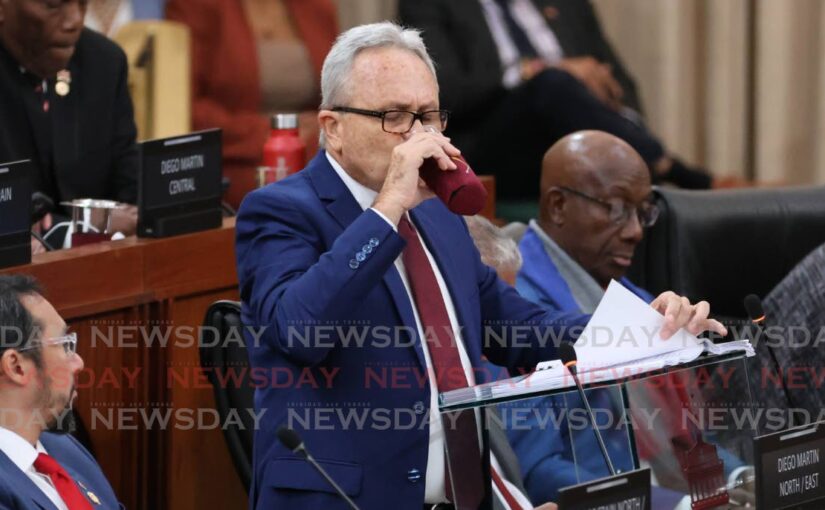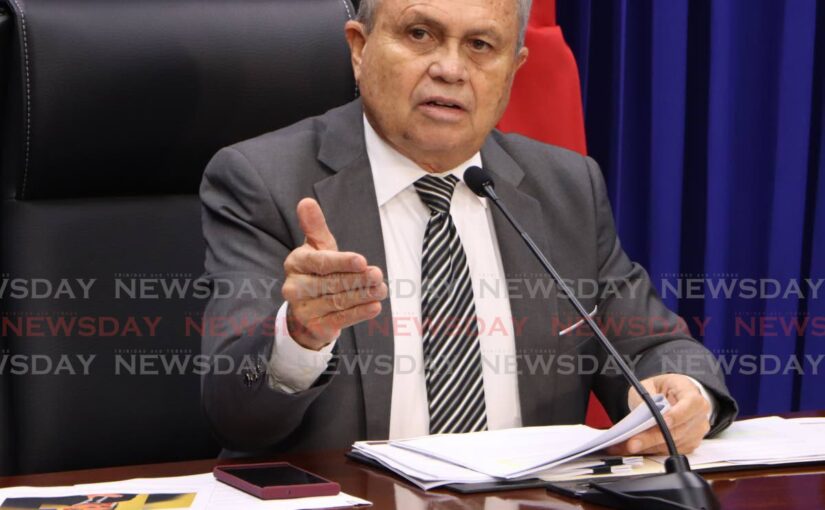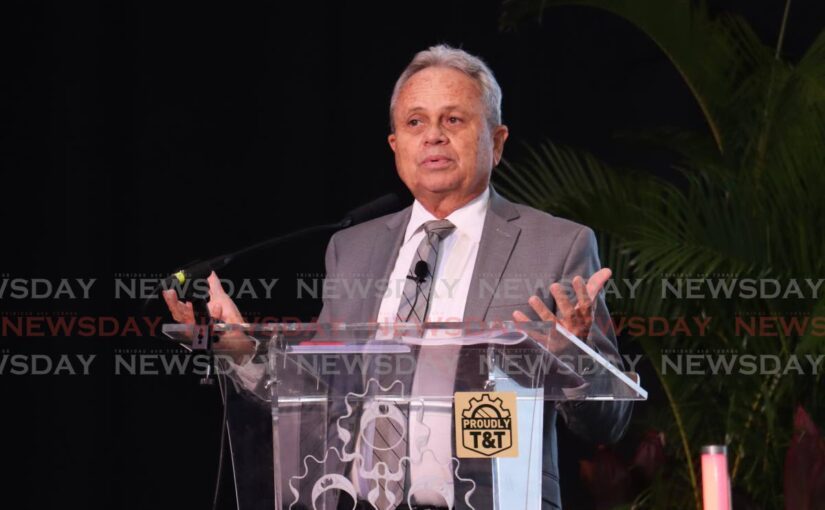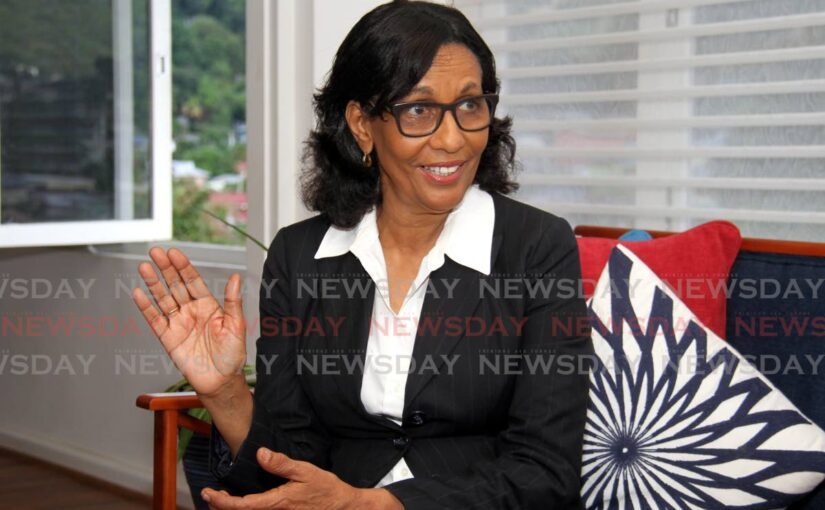THROUGHOUT his impasse with Auditor General Jaiwantie Ramdass, Minister of Finance Colm Imbert has been unafraid to exercise his legal rights. As the...
Vous n'êtes pas connecté
- English
- Français
- عربي
- Español
- Deutsch
- Português
- русский язык
- Català
- Italiano
- Nederlands, Vlaams
- Norsk
- فارسی
- বাংলা
- اردو
- Azərbaycan dili
- Bahasa Indonesia
- Հայերեն
- Ελληνικά
- Bosanski jezik
- українська мова
- Íslenska
- Türkmen, Түркмен
- Türkçe
- Shqip
- Eesti keel
- magyar
- Қазақ тілі
- Kalaallisut ; kalaallit oqaasii
- Lietuvių kalba
- Latviešu valoda
- македонски јазик
- Монгол
- Bahasa Melayu ; بهاس ملايو
- ဗမာစာ
- Slovenščina
- тоҷикӣ ; toğikī ; تاجیکی
- ไทย
- O'zbek ; Ўзбек ; أۇزبېك
- Tiếng Việt
- ភាសាខ្មែរ
- རྫོང་ཁ
- Soomaaliga ; af Soomaali
Rubriques :
 Maroc - NEWSDAY.CO.TT - A la Une - 02/Oct 04:10
Maroc - NEWSDAY.CO.TT - A la Une - 02/Oct 04:10
What value for our $26b?
WHEN IT comes to national security, Colm Imbert struck a gloomy note on September 30. In sharp contrast to the optimism and buoyancy throughout his budget presentation, the minister was almost pessimistic when it came to crime. The situation, he said, was “intractable,” “intransigent” and had defeated his government’s “best efforts.” While Mr Imbert was arguably tempering expectations in an election year, the defeatist suggestion of his language undermines the very confidence required to make headway. That’s not how things should be. Of all the factors affecting the economy, none is more insidious and immediate than crime. Whatever theoretical benefits might accrue through the budget’s lofty plans and promises, will be erased by a spiralling murder toll. This reality is reflected in Mr Imbert’s concession to the need to promulgate fresh measures. These include 2,000 new vehicles for the TTPS, the assignment of a special unit to deal with home invasions, new vessels for the Defence Force and a reformed digital infrastructure. This mixed bag, however, may not have a deep impact. The new vehicles come amid plans to increase recruitment numbers. If there are to be more officers, it is only natural for there to be more cars. Less straightforward is whether response times and detection rates will improve. The related acquisition of more body cameras is also meaningless when there appears to be no desire on the part of subordinate officers to wear them or on the part of superiors to enforce them. More stark and meaningful is Imbert's stark admission that notwithstanding $26 billion being spent on the Police Service over the last ten years, 3,986 murders still occurred over that period with the use of illegal firearms. A lot of the spending relates to recurrent expenditure, but that is no consolation. Many do not feel safer today than they did ten years ago. The budget’s reduced allocation for national security (it decreased from $6.9 billion in 2024 to $6.1 billion for 2025) perhaps acknowledges the serious issue of whether citizens are getting value for money. Nonetheless, the allocation is still substantial, amounting to the equivalent of the spending of four smaller ministries combined. The real cost of crime is not limited to police expenditure. Crime places pressure on health, judicial and prison systems. It hinders productivity. It dampens consumer spending. It scares away investors. It increases brain drain. It dissuades people from entrepreneurship. It destroys Tobago's tourism. It is not just a public health or social matter – it is an economic one. Which is why Mr Imbert’s stance was so despairing. Even if crime statistics somehow miraculously abate on the eve of the election, on the strength of new measures, for the PNM it may very well be too late to change the narrative. There are many questions that can be asked of government. Today, we ask: What value have we gotten for this $26 billion? The post What value for our $26b? appeared first on Trinidad and Tobago Newsday.
Articles similaires
JSC meets on Auditor General report on November 13
THE Parliament's Public Accounts Committee (PAC) will meet on November 13 at 10 am at the Red House to discuss the Auditor General's report on the...
Window into forex problem
THE GOVERNMENT’S decision to resume the importers’ limb of the EximBank’s preferential access window – at a reduced allocation of US$25...
Nunez-Tesheira: ‘Unacceptable’ for Imbert to ask EximBank for company’s info
FORMER finance minister Karen Nunez-Tesheira says an alleged breach of privacy by Finance Minister Colm Imbert, in inquiring about whether or not an...
Auditor General: I will continue to fight
AUDITOR General Jaiwantie Ramdass remains defiant in defence of her actions and that of her office, the head of her legal team suggested on November...
PNM Tobago leaders urge support for autonomy bills: ‘A step forward for Tobago’s future’
The leaders of the People’s National Movement (PNM) in Tobago say just because Tobagonians are not getting everything they want immediately out of...
Bytedance Reportedly Valued Around $300 Billion – TikTok's Parent Company
Bytedance, the parent company behind TikTok is now reportedly valued at around $300 billion, based on Bytedance's share buyback offer.Previously,...
Columnist tears into GOP's 'shower thought' plan for massive federal spending slash
President-elect Donald Trump intends to empower two loyalists to cut out large swaths of federal government expenditure, but a new analysis finds...
2025 budget: FG to borrow N13.8trn
ABUJA—THE Federal Executive Council (FEC) yesterday approved a budget proposal of N47.9 trillion for the 2025 fiscal year and borrowing of N13.8...
Gov. Yusuf presents N549bn 2025 budget proposal to Kano House of Assembly
Governor of Kano State, Abba Yusuf has presented the 2025 budget proposal to the State House of Assembly, totaling N549 billion. The budget...
Les derniers communiqués
-
Aucun élément









